 Featured – With days left, Black voters face orchestrated efforts to discourage voting. By April Glaser / NBC News
Featured – With days left, Black voters face orchestrated efforts to discourage voting. By April Glaser / NBC News
Among all of the social media disinformation campaigns that have preyed on voters in the run-up to Nov. 3, one domestic-originated tactic has become particularly troubling. Some Black social media influencers as well as Black community groups on Facebook who are more progressive than Biden and his running mate, Sen. Kamala Harris, are targeting Black voters less by deceiving them and more by what experts describe as voter depression. The goal is to make people who would otherwise vote feel that there’s no reason to do so, stoking inaction and apathy. Read more
Related: History, mistrust spurs Black early voters in Georgia. By Associate Press / NBC News
Related: Texas and the Long Tail of Voter Suppression. By Michael Barajas / The Nation
Political/Social
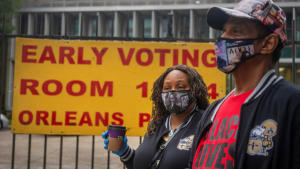 Economy, racial injustice: Young Ohioans are turning out the vote. By Ivette Feliciano / PBS News Hour
Economy, racial injustice: Young Ohioans are turning out the vote. By Ivette Feliciano / PBS News Hour
For the first time, young people, all born after 1980, make up more than half the U.S. population, according to a Brookings Institute analysis of the U.S. census — making them a significant share of eligible voters. Ivette Feliciano spoke with Prentiss Haney, Co-Executive Director of the Ohio Organizing Collaborative, on how his organization is helping develop the youth electorate. Read more
 Trump’s Last Stand for White America. By Roger Cohen / NYT
Trump’s Last Stand for White America. By Roger Cohen / NYT
Less than 20 days. It has been a long, hard road to this election. I see fearful faces, those of tormented migrants at the Mexican border, and hate-filled faces, those of the white nationalists in Charlottesville chanting, “Jews will not replace us.” Donald Trump has been all about the fear of replacement, or as it’s sometimes called, “the great replacement.” His has been the stand — I am tempted to say the last stand — of whites against nonwhites. Read more
Related: Trump’s rallies are overflowing with racism. By William Saletan / Slate
 I photographed Obama and Reagan. Here’s why Trump’s White House is a national disgrace. By Peter Souza / NBC News
I photographed Obama and Reagan. Here’s why Trump’s White House is a national disgrace. By Peter Souza / NBC News
I worked for arguably the most iconic Republican president of my generation (yes, I worked as an official photographer for Reagan) and for arguably the most iconic Democratic president of my generation. So I feel I have a unique vantage point, having observed two presidents from two different political parties as an insider. The presidency deserves someone who is competent and honest. Someone who has empathy and compassion. Someone who upholds the dignity, and shows respect to, the office. Someone who has character and knows ultimately the presidency isn’t about him (or someday her), but about us. Read more
 Which Constitution Is Amy Coney Barrett Talking About? By Jamelle Bouie / NYT
Which Constitution Is Amy Coney Barrett Talking About? By Jamelle Bouie / NYT
On Tuesday, Judge Amy Coney Barrett took a few minutes during her confirmation hearing to discuss her judicial philosophy, best known as originalism. It means, she explained, “that I interpret the Constitution as a law, I understand it to have the meaning that it had at the time people ratified it. That meaning doesn’t change over time and it is not up to me to update it or infuse my policy views into it.” Whereas the Constitution of 1787 established a white republic in which the right to property meant the right to total domination of other human beings, the Reconstruction Constitution established a biracial democracy that made the federal government what Charles Sumner called the “custodian of freedom” and a caretaker of equal rights. The Reconstruction Constitution is a fundamentally different document than the Constitution of 1787. Read more
 The bogus U.S. census numbers showing slavery’s ‘wonderful influence’ on the enslaved. By Peter Whoriskey / Wash Post
The bogus U.S. census numbers showing slavery’s ‘wonderful influence’ on the enslaved. By Peter Whoriskey / Wash Post
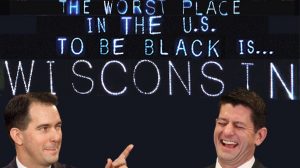 How Wisconsin Became a Bastion of White Supremacy. By Emma Roller / New Republic
How Wisconsin Became a Bastion of White Supremacy. By Emma Roller / New Republic
Wisconsin, under its veneer of Midwestern Niceness, is home to men and women who are as animated by white supremacy as in any state in the Deep South. If Democrats want to win Wisconsin this fall—a big “if” still, according to Democrats on the ground—they will have to face down the ugly, and still largely unacknowledged, legacy of white supremacy in America’s Dairyland. Read more
Related: SPLC releases audio on how neo-Nazi group recruits military, police. By Kim Hjelmgard / USA Today
 What is antifa? Is it a group or an idea, and what do supporters want? By Leslie Gornstein / CBS News
What is antifa? Is it a group or an idea, and what do supporters want? By Leslie Gornstein / CBS News
Right-wing media blames antifa members for rioting and looting. Democrats have also condemned such violence, but many on the left say the rhetoric about antifa is greatly exaggerated, and that it’s less of an organized movement than just something of “an idea.” But much of what politicians say about antifa isn’t quite true. Here’s what antifa is, what it isn’t, and what you need to know. Read more
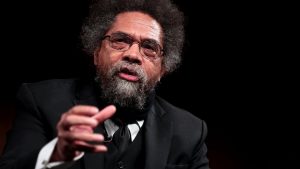 Viewers of the World, Unite! By Ed Rampell / The Progressive
Viewers of the World, Unite! By Ed Rampell / The Progressive
Director/producer Yael Bridge’s The Big Scary “S” Word is one of 2020’s do-not-miss films and deserves a Best Documentary Academy Award nomination. Contrary to the “reds-under-the-beds” propaganda that automatically links socialism to Stalinism, Harvard University professor Cornel West proclaims: “Socialism is as American as apple pie!” The Big Scary “S” Word explains why and how socialism became such a taboo term in the lexicon of U.S. public discourse, through its glimpses of such notorious redbaiters as Joe McCarthy, Ronald Reagan, Mike Pence, and Donald Trump. Read more
 Not enough or double the prejudice: On being Black and Asian American in 2020. By Sakshi Venkatraman and P.R. Lockhart / NBC News
Not enough or double the prejudice: On being Black and Asian American in 2020. By Sakshi Venkatraman and P.R. Lockhart / NBC News
With nationwide protests against police brutality, rising incidents of anti-Asian racism and the selection of Sen. Kamala Harris as the Democratic vice presidential nominee, race relations within and between the Asian American and Black communities have quickly shifted into focus. Conversations surrounding these groups, their subgroups and how they relate to one another have been messy and complicated. NBC BLK and NBC Asian America talked to 12 people who identify as both Black and Asian American Pacific Islander about their identities, their communities and what 2020 has meant for them. Read more
 People of color face disproportionate pandemic-related financial stress. By Michael Fox / CNBC
People of color face disproportionate pandemic-related financial stress. By Michael Fox / CNBC
The coronavirus pandemic is causing financial stress and anxiety for many Americans, yet it is people of color who are feeling it the most, according to an analysis of the American Staffing Association’s latest survey on the workforce. “The pandemic has disproportionately affected lower-income groups, especially those in occupations that do not lend themselves to remote work,” said the group’s CEO, Richard Wahlquist. Hispanics/Latinos and Blacks are more worried than whites about their employment situation, such as finding a new job, having the necessary skills to land a job, the need to transition to a new career or role, and losing a job. Read more
 Black Products. Black Shoppers. Black Workers. But Who Owns the Store? By Michael Corkey / NYT
Black Products. Black Shoppers. Black Workers. But Who Owns the Store? By Michael Corkey / NYT
The portion of the beauty industry that caters to Black women generates about $4 billion in sales a year. Much of those sales are rung up in small beauty supply stores, which are ubiquitous in predominantly Black neighborhoods. The stores seem like a natural answer to the numerous calls from policymakers and corporate America to create more Black-owned businesses after protests over systemic racism broke out this spring. Yet fewer than 10 percent are owned by Black women, said Tiffany Gill, a history professor at Rutgers University. Instead, many of them are owned by Korean immigrants. Read more
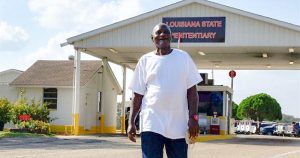 Black man serving life sentence for stealing hedge clippers granted parole. By Minyvonne Burke / The Associated Press / NBC News
Black man serving life sentence for stealing hedge clippers granted parole. By Minyvonne Burke / The Associated Press / NBC News
A Black man in Louisiana serving life in prison for stealing hedge clippers more than two decades ago was granted parole — months after the state’s Supreme Court declined to review his sentence. The Board of Pardons and Committee on Parole voted Thursday to release Fair Wayne Bryant, 63, records show. He walked out of prison later that day after serving more than 20 years at the state penitentiary in Angola, his attorney said. Read more
 Prosecutors say Amy Cooper lied about a Black man assaulting her. American history has many other, more tragic examples. By Nicole Chavez / CNN
Prosecutors say Amy Cooper lied about a Black man assaulting her. American history has many other, more tragic examples. By Nicole Chavez / CNN
When Amy Cooper called police for a second time, she claimed that a Black man birdwatching tried to assault her. But it was a lie, prosecutors say. A viral video captured the moments after Christian Cooper (no relation) asked her to leash her dog in Central Park. The incident in May was a flashpoint in ongoing national conversation about White people increasingly calling the police on Black people who are going about their everyday lives. It also took place on the same day Minneapolis police officers killed George Floyd. Here’s a look at some past cases involving false accusations by White women against Black men and boys. Read more
 Nearly three decades after George Floyd first left Cuney Homes, another generation tries to make it out of Houston’s oldest housing project. By Tracy Jan and Arelis R. Hernandez / Wash Post
Nearly three decades after George Floyd first left Cuney Homes, another generation tries to make it out of Houston’s oldest housing project. By Tracy Jan and Arelis R. Hernandez / Wash Post
Decades of government-sanctioned housing discrimination reverberate through this city. In one of the nation’s most diverse metropolises, much of the housing occupied by low-income Black families is segregated into the shape of a backward “C” around the city center, pierced by wealthier, Whiter neighborhoods to the west that form the shape of an arrow. The pattern, formed by Jim Crow-era policies dictating where African Americans could live, is cemented today by state law allowing landlords to discriminate against Section 8 voucher holders, weak enforcement of federal civil rights laws promoting integration, and White residents’ objections to the construction of affordable housing in affluent communities. Read more
 Schools often fail to identify gifted and talented students – especially if they are Black, Latino or Native American. By Marcia Gentry / The Conversation
Schools often fail to identify gifted and talented students – especially if they are Black, Latino or Native American. By Marcia Gentry / The Conversation
About a decade ago, I was working with a large, urban school district on creating a gifted and talented program that would include all kids, regardless of their race or income. In this district, Black children and children from poor families were rarely identified for gifted education services. These services include enrichment, special classes and focused projects intended to help students excel in areas in which they show signs of exceptional potential and talents. Read more
 The inside story of how Ice Cube joined forces with Donald Trump. By Alex Isenstadt / Politico
The inside story of how Ice Cube joined forces with Donald Trump. By Alex Isenstadt / Politico
This is the story of how Ice Cube wound up in a room with Jared Kushner less than two months before the election — then locked arms with Donald Trump in a move that delighted the president’s supporters and angered many African Americans. Late last month, the iconic rapper quietly slipped into Washington, D.C., for a three-hour meeting near the White House with Kushner and other senior advisers to Trump. After a summer of racial unrest, Ice Cube was promoting a “Contract with Black America” to help lift African Americans economically. He wanted the administration’s ear. Read more
Related: Ice Cube Explains Why He Started Working With Trump Campaign. By Jamil Smith / Rolling Stone
Cultural
 Watch Ethan Hawke, Joshua Caleb Johnson, and Lola Ogunnaike Discuss The Contemporary Relevance Of The Good Lord Bird. Vanity Fair Video
Watch Ethan Hawke, Joshua Caleb Johnson, and Lola Ogunnaike Discuss The Contemporary Relevance Of The Good Lord Bird. Vanity Fair Video
Produced by Vanity Fair with Showtime | Showtime’s new series, The Good Lord Bird, adapted from the award-winning novel by James McBride, is either making its debut at the right time, or possibly 155 years too late. Lola Ogunnaike speaks with Ethan Hawke and Joshua Caleb Johnson about the conversations we need to be having. Watch here
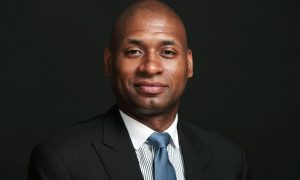 My Brother Died and Reminded Me of These Life Lessons. By Charles M. Blow / NYT
My Brother Died and Reminded Me of These Life Lessons. By Charles M. Blow / NYT
Saturday, I buried my brother in a segregated cemetery. (More on that later.) He was my oldest brother, Frederick Edward Blow, just 58, and he had battled the autoimmune disease sarcoidosis for nearly two decades. Most people never knew just how ill he was. He hid it well behind a larger-than-life personality. But, in the end, his body was too weakened and too damaged to fight off the final wave of infections. Read more
 Country music’s reckoning: Black women forge their own path in whitewashed industry. By Oiliva Roos / NBC News
Country music’s reckoning: Black women forge their own path in whitewashed industry. By Oiliva Roos / NBC News
Rissi Palmer was fed up with reading music articles that mentioned the same five country artists of color over and over again, seemingly erasing the expansive history of Black and brown artists’ contributions to country music. That’s why Palmer, a successful country artist who has performed at the White House, Lincoln Center and the Grand Ole Opry, started her Apple Music radio show, “Color Me Country.” The show aims to recognize and validate the presence and history of Black and brown women in country music, including Mickey Guyton, Tiera, Miko Marks and many others. Read more
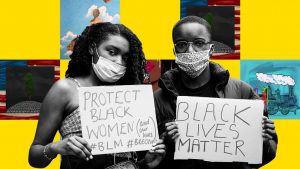 Protest music found a home in contemporary pop. By Taylor Crumpton / The Undefeated
Protest music found a home in contemporary pop. By Taylor Crumpton / The Undefeated
Over the summer, many musicians participated in a centuries-old tradition, the creation of protest music, a form of rhetorical advocacy that addresses injustice and to persuade listeners to initiate political and social change. In the streets and on Billboard charts, musicians crafted a soundtrack to archive and document this summer’s latest iteration of the fight for Black lives. Their songs encapsulated our collective anger, hope, rage, sorrow and joy. And protest music found a home in contemporary pop. Read more
Sports
 How baseball’s first commissioner led a conspiracy of silence to preserve baseball’s color line. By Chris Lamb / The Conversation
How baseball’s first commissioner led a conspiracy of silence to preserve baseball’s color line. By Chris Lamb / The Conversation
The Baseball Writers’ Association of America recently announced that it would remove former Major League Baseball Commissioner Kenesaw Mountain Landis’ name from the plaques awarded to the American and National League MVPs. The decision came after a number of former MVPs, including Black award winners Barry Larkin and Terry Pendleton, voiced their displeasure with their plaques being named for Landis, who kept the game segregated during the 24 years he served as commissioner from 1920 until his death in 1944. Read more
Visit our home page for more articles, book/podcast and video favorites. And at the top of this page register your email to receive notification of new editions of Race Inquiry Digest. Click here for earlier Digests.
Use the buttons below to share the Digest in an email, or post to your Facebook, Linkedin or Twitter accounts.